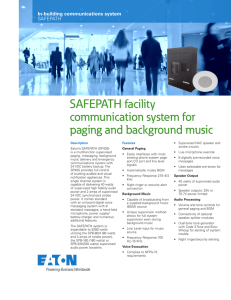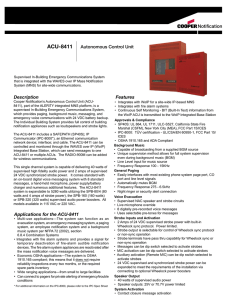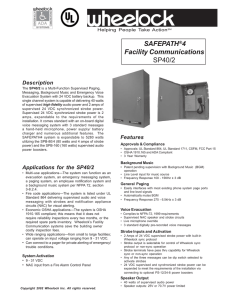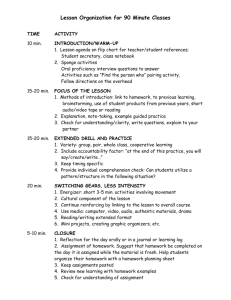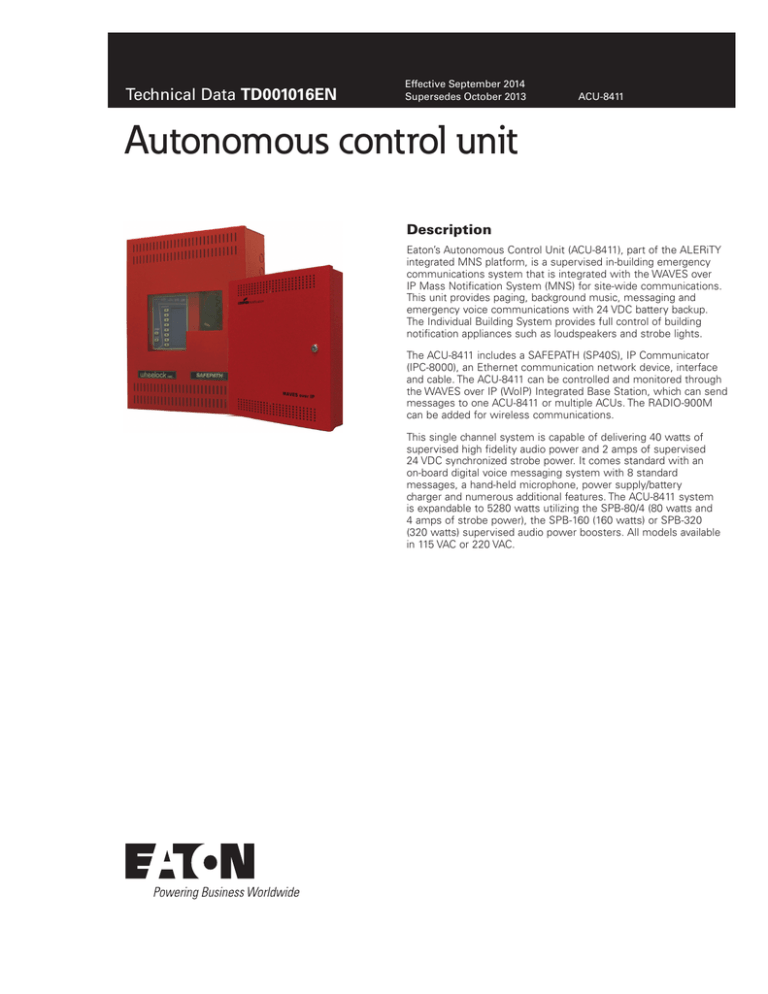
Technical Data TD001016EN
Effective September 2014
Supersedes October 2013
ACU-8411
Autonomous control unit
Description
Eaton’s Autonomous Control Unit (ACU-8411), part of the ALERiTY
integrated MNS platform, is a supervised in-building emergency
communications system that is integrated with the WAVES over
IP Mass Notification System (MNS) for site-wide communications.
This unit provides paging, background music, messaging and
emergency voice communications with 24 VDC battery backup.
The Individual Building System provides full control of building
notification appliances such as loudspeakers and strobe lights.
The ACU-8411 includes a SAFEPATH (SP40S), IP Communicator
(IPC-8000), an Ethernet communication network device, interface
and cable. The ACU-8411 can be controlled and monitored through
the WAVES over IP (WoIP) Integrated Base Station, which can send
messages to one ACU-8411 or multiple ACUs. The RADIO-900M
can be added for wireless communications.
This single channel system is capable of delivering 40 watts of
supervised high fidelity audio power and 2 amps of supervised
24 VDC synchronized strobe power. It comes standard with an
on-board digital voice messaging system with 8 standard
messages, a hand-held microphone, power supply/battery
charger and numerous additional features. The ACU-8411 system
is expandable to 5280 watts utilizing the SPB-80/4 (80 watts and
4 amps of strobe power), the SPB-160 (160 watts) or SPB-320
(320 watts) supervised audio power boosters. All models available
in 115 VAC or 220 VAC.
Technical Data TD001016EN
ACU-8411
Effective September 2014
Features
SPB-320: 320-watt supervised audio power booster
Live & pre-recorded message announcement
•
Integrates with WoIP for a site-wide IP-based MNS
•
Integrates with fire alarm systems
•
Supplied with 8 pre-recorded emergency messages
ontinuous Self Monitoring: BIT (Built-In Test) information from
C
the WoIP ACU is transmitted to the WoIP Integrated Base Station
•
Capable of in-field recording of all messages via 1/8” line level
audio input jack
•
Preset audio levels for emergency messaging (prerecorded and
live mic)—system reverts back to a preset level regardless of
the volume set for BGM or general paging
•
On board push-to-talk microphone
•
Telephone paging input, disconnects BGM when in use
•
Auxiliary input for remote microphone connection
•
Background music
•
Capable of broadcasting from a supplied background music
(BGM) source
•
Unique supervision method allows for full system supervision even during background music
•
Line Level input for music source
•
Frequency Response 100–15KHz
General paging
•
Easily interfaces with most existing phone system page port,
CO port and line level signals
•
Automatically mutes BGM
•
Frequency Response 275–6.5kHz
•
Night ringer or security alert connection
Voice evacuation
•
Supervised NAC speaker and strobe circuits
•
Live microphone override
•
8 digitally pre-recorded voice messages
•
Uses selectable pre-tones for messages
Strobe inputs and activation
•
•
•
•
•
•
•
2 Amps of 24 VDC supervised strobe power with built-in
Wheelock sync protocol. Power limited.
Strobe output is selectable for control of Wheelock sync
protocol or non-sync operation
Strobe terminals have pass-through capability for Wheelock
sync or non-sync operation
Messages can be dip switch selected to activate strobes
MIC activation can be dip switch selected to activate strobes
Auxiliary activation (Remote MIC) can be dip switch selected
to activate strobes
24 VDC supervised and synchronized strobe power can be
expanded to meet the requirements of the installation via
connecting to optional Wheelock power boosters
Speaker output
•
40 watts of supervised audio power
•
Speaker outputs: 25V or 70.7V power limited
System activation
•
Contact closure message activation
Audio processing
Power supply & batteries
•
24 VDC, 33AH max rechargeable battery back-up power
circuitry built-in
•
Batteries can be housed in the enclosure. Up to two BAT-1212,
12 volt, 12 ampere hour batteries can fit in the enclosure. Actual
battery size required will depend on speaker and/or strobe load.
(Batteries are sold separately.)
NNote: All CAUTIONS and WARNINGS are identified by the symbol
All warnings are printed in bold capital letters.
.
WARNING
PLEASE READ THESE SPECIFICATIONS AND ASSOCIATED INSTALLATION
INSTRUCTIONS CAREFULLY BEFORE USING, SPECIFYING OR APPLYING
THIS PRODUCT. FAILURE TO COMPLY WITH ANY OF THESE INSTRUCTIONS,
CAUTIONS OR WARNINGS COULD RESULT IN IMPROPER APPLICATION,
INSTALLATION AND/OR OPERATION OF THESE PRODUCTS IN AN
EMERGENCY SITUATION, WHICH COULD RESULT IN PROPERTY DAMAGE,
AND SERIOUS INJURY OR DEATH TO YOU AND/OR OTHERS.
Benefits & Advantages
•
One system multi-function facility communications system
•
Background Music (BGM) system, with patent-pending
supervision during BGM operation
•
Supervised emergency/fire voice evacuation system
•
Interfaces with telephone system for general paging requirements
•
Built-in power for visual notification appliances (e.g., strobes)
•
Expandable for larger system requirements
(with optional equipment)
Approvals & compliance
•
P40S: UL 864, UL 1711, ULC-S527, California State Fire Marshal
S
(CSFM), New York City (MEA), FCC Part 15/ICES
•
IPC-8000: TÜV certification — UL/CSA/EN 60950-1,
FCC Part 15/ICES
•
Volume and tone controls for general paging and BGM
Applications
•
Connectivity of optional speaker splitter modules
•
•
Dual-tone tone generator with Code 3 Tone and Slow Whoop
for alerting of system trouble
•
Night ringer/security alerting capability
Multi-use applications: The system can function as an evacuation system, an emergency messaging system, a paging system,
an employee notification system and a background music system
per NFPA 72 (2002), section 6.8.4 Combination Systems.
Audio power can be expanded by connecting to optional audio
power boosters
• SPB-80/4: 80-watt supervised audio power booster with
4 Amp of Synchronized Strobe Power
•
•
Integrates with fire alarm systems and provides a signal for
temporary deactivation of fire-alarm audible notification devices.
The fire alarm system appliances are reactivated after the mass
notification voice messages are delivered.
•
Economic OSHA applications: The system is OSHA 1910.165
compliant and therefore it does not require reliability inspections
every two months or the required spare parts inventory
•
2
•
SPB-160: 160-watt supervised audio power booster
EATON www.eaton.com
ACU-8411
Technical Data TD001016EN
Effective September 2014
•
Wide ranging applications—from small to large facilities
•
Can connect to pagers for private alerting of emergency/
trouble conditions
Installation & maintenance
•
Multiple trouble LED indicators for quick system diagnostics
•
Fully supervised circuitry always in effect—even during BGM and
general paging (via patent pending technology)
•
Removable quick connect/disconnect terminals for ease of wiring;
accepts #12 to #22 AWG
•
Power-limited circuitry with Class “B” or Class “A” wiring
(Class “A” only with use of audio splitter)
•
Surge protected circuitry
•
Audio and strobe power limiter reset button
Compatible Wheelock Products
•
All Wheelock speaker/strobes
•
All Wheelock strobes
•
All Wheelock speakers
•
All cluster speakers
•
Wheelock strobe power supply
Table 1. Inputs: Audio & Activation
Priority Ordered Inputs
Priority Level Type of Input
On Board Microphone
Auxiliary
Digital Message Input 1
Digital Message Input 2
Digital Message Input 3
Digital Message Input 4
Digital Message Input 5
Digital Message Input 6
Digital Message Input 7
Digital Message Input 8
Night Ringer Input
Telephone Paging Input
Background Music Input
1
2
3
4
5
6
7
8
9
10
11
12
13
Push to Talk (PTT) Microphone
Remote Microphone or Remote Microphone Expander
Contact Closure activation
Contact Closure input
Page port input
Line Level Input, 600 ohm, input voltage must be less than 2.5 V peak to peak
or 0.3 volts RMS
Table 2. Inputs: Audio/Technical Specificationsa
Table 3. SP40S Mechanicala
Switch mode, Class D amplifier (40 Watts)
Auxiliary
25V or 70.7V power limited
Frequency Response
Voice: 275 Hz – 6.5 kHz
BGM: 100 Hz – 15 kHz
Meets UL Voice Evacuation Requirements of
800 – 2800 Hz
Signal-to-Noise Ratio
Better than 65 dB
Dynamic Range
Better than 65 dB
Total Harmonic Distortion
Less than 2%
Stand by Current Draw
130 mA
Alarm Current Draw
4.7 amps
Dimensions
Weight
Finish
Door Lock
21” H x 16” W x 6” D (wall mount)
36 lbs. (without batteries)
Red or black exterior enclosure
Wheelock Key-lock
a For information on the IPC-8000, please refer to the IPC Spec Sheet
EATON www.eaton.com
3
Technical Data TD001016EN
ACU-8411
Effective September 2014
Table 4. Order Information
Model Number
Order Code
Description
ACU-8411
Same
BAT-1212
SP40S-PMK
AM-SP40S-SMK
AM-SP40S-PMK
AM-SP40S-NBT
SP-COA
BATC-R
BATC-B
BAT-1224
7390
9936
9937
9938
9939
9908
5414
5413
7391
Multi-Function Supervised Paging, Messaging, Background Music delivery and Emergency Voice Evacuation System with 24 VDC
battery backup circuitry. Includes SP40S, IPC-8000*, interface and cable. Single channel system with 40 watts of supervised audio
power and 2 amps of supervised 24 VDC synchronized strobe power and 8 standard messages. (Batteries not included, 2 required)
Red Enclosure.
12 volt, 12-ampere hour battery
SP40S 8 Message Programmed Message Kit
SP40S After Market 8 Message Standard Message Kit
SP40S After Market 8 Message Programmed Message Kit
SP40S After Market Narrow Band Signal Tone Kit
C.O. Port Adapter for the SP40S – Recommended 24 VDC Power Supply is Wheelock RPS-2406 (Order Code 3770)
Battery Cabinet, Red
Battery Cabinet, Black
12 Volt, 24Ampere Battery Cell
Table 5. Message Capabilities
Message and
Priority #
Type of
Message
Voice Type
Message Script
1
Male
Three (3) rounds of code 3 horn (followed by): “May I have your attention please! A fire emergency has been reported in the
building. While this is being verified, please leave the building by the nearest exit. Do not use the elevators.”
Female
Three (3) rounds of code 3 horn (followed by): “May I have your attention please! A fire emergency has been reported in the
building. While this is being verified, please leave the building by the nearest exit. Do not use the elevators.”
3
Fire
(Do not use
elevators)
Fire
(Do not use
elevators)
Fire
Male
4
Emergency
Female
5
Emergency
Male
6
Weather
Male
7
All Clear
Male
8
Test
Male
Three (3) rounds of code 3 horn (followed by): “May I have your attention please! A fire emergency has been reported in the
building. While this is being verified, please leave the building by the nearest exit.”
Three (3) rounds of code 3 horn (followed by): “May I have your attention please! An emergency has been reported in the building.
While this is being verified, please leave the building by the nearest exit.”
Three (3) rounds of code 3 horn (followed by): “May I have your attention please! An emergency has been reported in the building.
While this is being verified, please leave the building and report to the designated assembly area for your group.”
Five (5) seconds of 1kHz tone (followed by): “May I have your attention please! The National Weather Service has issued a severe
weather warning for our area.”
Five (5) seconds of 1kHz tone (followed by): “May I have your attention please! The building emergency has ended. An all clear
has been given. Please resume normal activities.”
Five (5) seconds of 1kHz tone (followed by). “May I have your attention please! This is a test of the Wheelock evacuation system,
repeat, this is only a test.”
2
•
Each message can be selected to have a code 3 pre-alert tone, a 1kHz continuous pre-alert tone, or no pre-alert tone
•
Post-tones are also selectable and match the pre-tones for individual messages
•
Any of the 8 messages are field programmable to record your own custom message
• Each message length is 30 seconds
•
•
A 1/8” line level audio input jack is supplied for message recording
•
A two-step recording procedure is required to ensure and verify that the standard message will be permanently erased
Factory programmed messages are available for custom messages
• Contact customer service for additional information
•
Form is required and can be downloaded from www.coopernotification.com
NNote: For telephone paging, the SP40S can connect directly into the page port of the local phone system. If a page port is inaccessible, the SP-COA (C.O. Port Adapter for the SP40S) may be used to connect the SP40S to an unused C.O. port or stand-alone telephone.
Wheelock products must be used within their published specifications and must be PROPERLY specified, applied, installed, operated, maintained and operationally tested in accordance with their installation instructions at the time of installation and at least twice a year or
more often and in accordance with local, state and federal codes, regulations and laws. Specification, application, installation, operation,
maintenance and testing must be performed by qualified personnel for proper operation in accordance with all of the latest National Fire
Protection Association (NFPA), Underwriters’ Laboratories (UL), National Electrical Code (NEC), Occupational Safety and Health Administration
(OSHA), local, state, county, province, district, federal and other applicable building and fire standards, guidelines, regulations, laws and
codes including, but not limited to, all appendices and amendments and the requirements of the local authority having jurisdiction (AHJ).
4
EATON www.eaton.com
ACU-8411
Technical Data TD001016EN
Effective September 2014
Architects and engineers specifications
ACU-8411 In-Building Emergency Communications System
The ACU-8411 or equivalent system shall be a multi-purpose NFPA compliant, supervised, general-purpose audio, and fire/emergency
communications system. The system shall include a SAFEPATH® (SP40S), IP Communicator (IPC-8000*), interface, and cable or
equivalent and shall be controlled and monitored by a base-wide WAVES over IP (WoIP) Mass Notification System (MNS) for an integrated
site-wide MNS.
The system shall be a single channel voice evacuation system incorporating supervision during the broadcasting of background music
and general paging. The system shall be capable of delivering 40 watts of supervised audio power and 2 amps of supervised 24 VDC
synchronized strobe power. Minimum supervised audio power shall be 40 watts, expandable to 5280 watts, depending on system
configuration and with additional modules and power boosters. Supervised 24 VDC synchronized strobe power shall be 2 amps,
expandable to the requirements of the installation. The system shall be capable of operating from a 120 VAC power source. E models shall
be capable of operating from a 240 VAC power source. All models shall have a 24 VDC battery backup. Standard on-board system features
shall include: digital voice messaging, a hand-held push-to-talk microphone with override priority, and a power supply/battery charger. The
system shall be capable of interfacing with telephone systems for general paging announcements and will have night ringer capabilities.
Form C contacts shall be provided for system alarm and trouble conditions.
The system shall have 8 message contacts with contact closure activation. Background music input voltage shall be capable of handling
less then 2.5 V peak to peak or less then 0.3 volts. The system shall have thirteen priority ordered inputs, including: On Board Microphone,
Auxiliary Input (Line Level), 8 Digital Messages, Night Ringer Input, Telephone Paging Input, and Background Music Input. The system shall
have preset audio levels for emergency messaging (prerecorded and live mic). The system shall revert back to a preset level regardless of
the volume set for background music (BGM) or general paging. Background music inputs can be an AM/FM tuner, cassette, CD, MP3, or any
other remote source. The system shall be supplied with 8 pre-recorded messages and be capable of in-field recording of customer unique
messages. The system shall have a dual-tone tone generator with Code-3 Tone and Slow Whoop. When the system is on battery power,
telephone page, night ring and background music shall be disengaged.
The panel shall have power-limited circuitry with an internal battery charger and power supply. The power supply/charger section shall be
able to charge 24 VDC batteries with a maximum capacity of 33 amp hours. Up to two 12 VDC, 12 AH batteries may be housed in the
enclosure. Batteries larger than 12 Ah shall be housed in a separate enclosure such as the Cooper Wheelock BATC or equivalent.
Batteries shall be supplied separately.
The system shall have power limited circuitry and class B wiring. Wiring terminal blocks will be removable and accept #22–#12 AWG wire.
Audio output voltage shall be selectable for 25V or 70.7V. The voice (live microphone or recorded message) frequency response shall be
275 Hz–6.5 kHz, background music frequency response shall be 100 Hz – 15 kHz. Stand by current draw shall be 140mA. Alarm current draw
shall be 4.7 amps. The signal to noise ratio shall be better than 65 dB, dynamic range shall be better than 65 dB, total harmonic distortion
shall be less than 2%.
The system shall be wall mountable, enclosed in a steel locking enclosure. The required batteries for 40-watt systems shall fit inside
the enclosure. The 40 watt system shall weigh no more than 36 lbs (without batteries) and the SP40S dimensions shall not exceed
21” H x 16” W x 6” D, and the IPC-8000 dimensions shall not exceed 17 H x 15 W x 5.5 D in. The system shall be OSHA 1910.165,
and ADA compliant.
*For A&E specifications for the IPC-8000, please refer to the IPC Spec Sheet.
NNote: Due to continuous development of our products, specifications and offerings are subject to change without notice in accordance with Eaton’s
Cooper Notification business standard terms and conditions.
WE ENCOURAGE AND SUPPORT NICET CERTIFICATION
18 MONTH WARRANTY
Eaton
1000 Eaton Boulevard
Cleveland, OH 44122
United States
Eaton.com
Eaton
Cooper Notification
273 Branchport Ave.
Long Branch, NJ 07740
CooperNotification.com
© 2014 Eaton
All Rights Reserved
Printed in USA
Publication No. TD001016EN
September 2014
Eaton is a registered trademark.
All other trademarks are property
of their respective owners.

